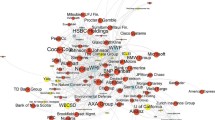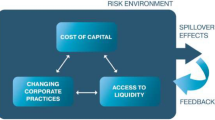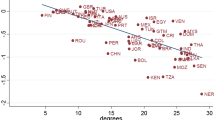Abstract
Research on international climate finance got a new impetus from the United Nations Framework Convention on Climate Change Cancun Accords in 2010 which pledge to mobilize US dollars (USD) 100 billion in international climate financing annually by 2020. The Accords’ specification that adaptation must be addressed with the same priority as mitigation is not reflected in current patterns of international climate finance where we face a strong bias towards mitigation finance. A recent study by Buchner et al. (2011) ascertains a split between mitigation and adaptation finance of 95:5. In this paper, we investigate potential reasons for this bias. In our framework, we distinguish different decision layers and actors involved in international climate finance in order to categorize the causes responsible for the low priority of adaptation in international finance. The identification of obstacles for international adaptation funding is a first crucial step in the search for ways to overcome respective barriers. We find several different causes of the mitigation bias and these might offer starting points for policies aiming at raising adaptation finance and curing this bias. Furthermore, we describe interrelations between these causes which effective policies have to take into account.
Similar content being viewed by others
References
Aaheim A (2009) Ancillary benefits of adaptation to climate change. In: John KD, Rübbelke DTG (eds) Benefits of environmental policy. Routledge, London and New York, pp 36–60
Aakre S, Rübbelke DTG (2010) Objectives of public economic policy and the adaptation to climate change. J Environ Plan Manag 53:767–791
Anantram K, Noronha L (2005) Financing adaptation. Discussion paper, The Energy and Resource Institute, New Delhi
Atteridge A (2011) Will private finance support climate change adaptation in developing countries? Historical investment patterns as a window on future private climate finance. SEI Working Paper No. 2011-05, Stockholm
Barnett J, O’Neill S (2010) Editorial: maladaptation. Glob Environ Chang 20:211–213
Barr R, Fankhauser S, Hamilton K (2010) Adaptation investments: a resource allocation framework. Mitig Adapt Strateg Glob Chang 15:843–858
Barrett S (2007) Proposal for a new climate change treaty system. Econ Voice. October
Barrett S (2008a) Climate treaties and the imperative of enforcement. Oxf Rev Econ Policy 24:239–258
Barrett S (2008b) Dikes v. windmills: climate treaties and adaptation. Paper presented at the workshop ‘The Environment, Technology and Uncertainty’, the Ragnar Frisch Centre for Economic Research, Oslo
Barrett S, Stavins R (2003) Increasing participation and compliance in international climate change agreements. Int Environ Agreements 3:349–376
Bird N, Brown J, Schalatek L (2011) Design challenges for the Green Climate Fund. Climate Finance Policy Brief No. 4, Heinrich Böll Stiftung North America
Bowen A (2011) Raising climate finance to support developing country action: some economic considerations. Clim Pol 11:1020–1036
Brown J, Jacobs M (2011) Leveraging private investment: the role of public sector climate finance. Background Note, April 2011. Overseas Development Institute, London
Buchner B, Falconer A, Hervé-Mignucci M, Trabacchi C, Brinkman M (2011) The landscape of climate finance. CPI report. Climate Policy Initiative, Venice
Butzengeiger-Geyer S, Michaelowa A, Köhler M, Stadelmann M (2011) Market mechanisms for adaptation to climate change: lessons from mitigation and a pathway to implementation. CIS Working Paper No. 71. ETH Zurich and University of Zurich
Carraro C, Massetti E (2012) Beyond Copenhagen: a realistic climate policy in a fragmented world. Clim Chang 110:523–542
Chaum M, Faris C, Wagner G, Buchner B, Falconer A, Trabacchi C, Brown J, Sierra K (2011) Improving the effectiveness of climate finance: key lessons. Climate Policy Initiative, Venice
Cornes RC, Sandler T (1984) Easy riders, joint production, and public goods. Econ J 94:580–598
Cornes RC, Sandler T (1996) The theory of externalities, public goods and club goods. Cambridge University Press, Cambridge
Fankhauser S, Burton I (2011) Spending adaptation money wisely. Clim Pol 11:1037–1049
Gallastegui MC, Galarraga I, González M (2009) La Ciencia del Cambio Climático: Una Visión General. Papeles de Economía Española 131:1–24
Gibson CC, Andersson K, Ostrom E, Shivakumar S (2005) The samaritan’s dilemma—the political economy of development aid. Oxford University Press, Oxford
Global Climate Network (2010) Investing in clean energy–how can developed countries best help developing countries finance climate-friendly energy investments?. Global Climate Network Discussion Paper No. 4, London
Grasso M (2010) An ethical approach to climate adaptation finance. Glob Environ Chang 20:74–81
Grasso M (2011) The role of justice in the north–south conflict in climate change: the case of negotiations on the adaptation fund. Int Environ Agreements 11:361–377
Haites E (2011) Climate change finance. Clim Pol 11:963–969
Heuson C, Gawel E, Gebhardt O, Hansjürgens B, Lehmann P, Mayer V, Schwarze R (2012) Fundamental questions on the economics of climate adaptation: outlines of a new research programme. UFZ-Bericht, Helmholtz-Zentrum für Umweltforschung, No. 05/2012, Leipzig
Hof AF, den Elzen MGJ, Mendoza Beltran A (2011) Predictability, equitability and adequacy of post-2012 international climate finance proposals. Environ Sci Pol 14:615–627
IPCC (2007) In: Parry ML, Canziani OF, Palutikof JP, van der Linden PJ, Hanson CE (eds) Climate change 2007: impacts, adaptation and vulnerability. Contribution of working group II to the fourth assessment report of the intergovernmental panel on climate change. Cambridge University Press, Cambridge
Jotzo F, Pickering J, Wood PJ (2011) Fulfilling Australia’s international climate finance commitments: which sources of financing are promising and how much could they raise? CCEP Working Paper No. 1115. Centre for Climate Economics & Policy, Crawford School, Australian National University, Canberra
Krupnick A, Burtraw D, Markandya A (2000) The ancillary benefits and costs of climate change mitigation: a conceptual framework. In: OECD (ed) Ancillary benefits and costs of greenhouse gas mitigation. Paris, 53–93
Lobell DB, Burke MB, Tebaldi C, Mastrandrea MD, Falcon WP, Naylor RL (2008) Prioritizing climate change adaptation needs for food security in 2030. Science 319:607–610
Markandya A, Galarraga I (2011) Technologies for adaptation: an economic perspective. In: Technologies for adaptation: perspectives and practical experience. Perspectives series 2011, UNEP Risoe Centre, Roskilde
OECD (2011) Development perspectives for a post-2012 climate financing architecture. OECD, Paris
Persson Å (2011) Institutionalising climate adaptation finance under the UNFCCC and beyond: could an adaptation ‘market’ emerge? SEI Working Paper No. 2011-03, Stockholm
Persson Å, Klein RJT, Kehler Siebert C, Atteridge A, Müller B, Hoffmaister J, Lazarus M, Takama T (2009) Adaptation finance under a Copenhagen agreed outcome. SEI research report. Stockholm Environment Institute, Stockholm
Pittel K, Rübbelke DTG (2012) International climate finance and its influence on fairness and policy. World Econ, forthcoming
Rübbelke DTG (2002) International climate policy to combat global warming: an analysis of the ancillary benefits of reducing carbon emissions. Edward Elgar, Cheltenham
Rübbelke DTG (2011) International support of climate change policies in developing countries: strategic, moral and fairness aspects. Ecol Econ 70:1470–1480
Schelling TC (1992) Some economics of global warming. Am Econ Rev 82:1–14
Seo SN (2010) A theory of adaptation to climate change as a global public good. USAEE-IAEE-WP 10-041, Cleveland
Soltau F (2009) Fairness in international climate change law and policy. Cambridge University Press, Cambridge
Stern N (2008) The economics of climate change. Am Econ Rev 98:1–37
Sussman FG, Freed JR (2008) Adapting to climate change: a business approach. Prepared for the Pew Center on Global Climate Change
UNFCCC (2011) Report of the conference of the parties on its sixteenth session; addendum: part two: action taken by the conference of the parties at its sixteenth session. FCCC/CP/2010/7/Add.1
Weitzman ML (2009) On modeling and interpreting the economics of catastrophic climate change. Rev Econ Stat 91:1–19
World Bank (2006) Clean energy and development: towards an investment framework. World Bank, Washington
Acknowledgments
The work Ibon Galarraga and Dirk Rübbelke devoted to this paper was partly funded under the project “Strategic Challenges in International Climate and Energy Policy (CICEP)” sponsored by the Research Council of Norway. Luis M. Abadie is gratefully for the financial support he received from the Spanish Ministry of Science and Innovation.
Author information
Authors and Affiliations
Corresponding author
Rights and permissions
About this article
Cite this article
Abadie, L.M., Galarraga, I. & Rübbelke, D. An analysis of the causes of the mitigation bias in international climate finance. Mitig Adapt Strateg Glob Change 18, 943–955 (2013). https://doi.org/10.1007/s11027-012-9401-7
Received:
Accepted:
Published:
Issue Date:
DOI: https://doi.org/10.1007/s11027-012-9401-7




